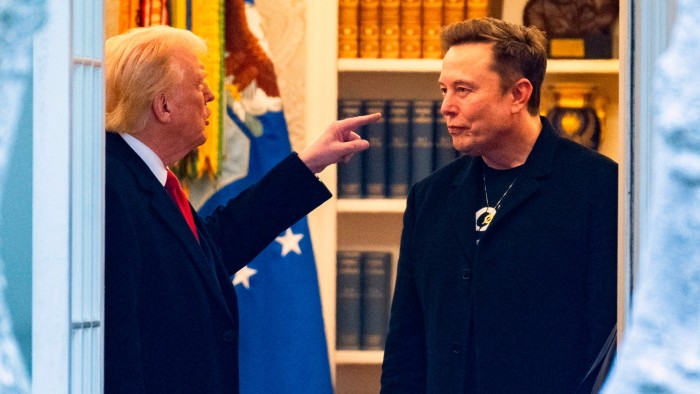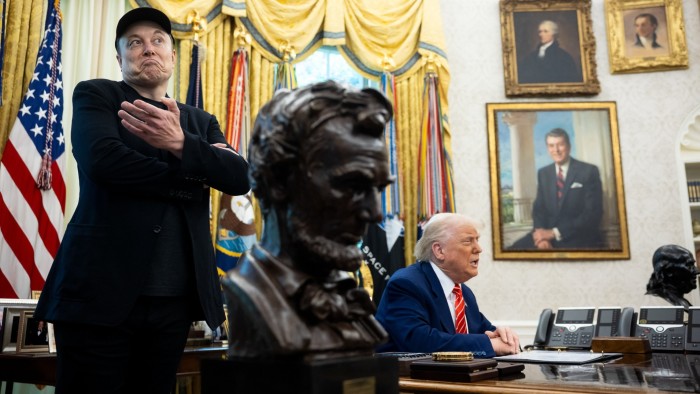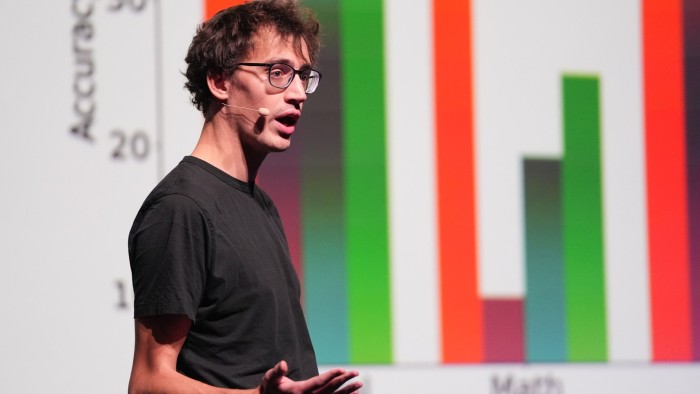Trump and Musk’s allies urge reconciliation after damaging split

Allies of Donald Trump and Elon Musk have urged the US president and his billionaire backer to repair their relationship, seeking to limit the political and commercial damage from this week’s spectacular split.
The fissure between the powerful pair, ostensibly over the president’s signature tax bill, threatens to derail the White House’s legislative agenda and wreck a hard-won alliance between Silicon Valley and Washington.
“It is unfortunate . . . I hope they will come back together,” Texas senator Ted Cruz, who was in the Oval Office when Trump slammed Musk, said on Friday. “A lot of conservatives are feeling like this is not good, let’s hug and make up.”
The Tesla chief executive, who had spent Thursday launching more explosive attacks on Trump, seemed to be open to a détente, responding positively to hedge fund manager Bill Ackman, who urged the duo to “make peace for the benefit of our great country”.
Trump on Friday claimed he was “not even thinking about Elon”, before adding on CNN: “The poor guy’s got a problem . . . I won’t be speaking to him for a while I guess, but I wish him well.”
The president spent the morning touting his administration’s record on the economy after lacklustre jobs numbers and urging the Federal Reserve to cut interest rates.
Tech figures who backed the administration hoping it would usher in an era of tax cuts and deregulation have been racing to contain the quarrel, with limited success.
“Elon isn’t taking calls from anyone,” one Silicon Valley financier and big donor to Republican candidates told the Financial Times. “Not from people who have billions invested in his companies . . . The Valley is losing their shit.”
Attempts to get Trump to reconcile with his former “first buddy” were set back on Friday morning by news the president planned to sell or give away the Tesla he had bought in March as a show of support for Musk. The White House also dismissed reports of a conciliatory phone call between the two men.
Billionaire Tim Draper, who invested in Tesla and SpaceX, urged Trump and Musk to reunite to save the so-called Department of Government Efficiency, an initiative that was backed by many in the tech world and staffed by Silicon Valley executives.
“They seemed to be making good progress together,” Draper told the FT. “My advice: Don’t throw the baby out with the bath water.”
However, cracks in Silicon Valley and Washington’s marriage of convenience had been appearing for weeks, particularly over Trump’s tax bill that irked Musk. Deficit hawks have balked at the legislation adding trillions to the US debt pile, while more socially progressive tech figures have bridled at proposed cuts to entitlement programmes such as Medicaid.
“I am fully for pursuing the elimination of waste and fraud,” said Jon McNeill, a former Tesla president who worked alongside Musk and runs start-up incubator DVx Ventures. “But at the same time, I don’t want a tax break so badly as to make the most vulnerable suffer. And from what I’m hearing, a lot of my peers feel the same way.”
Musk’s allies aligned with Trump fear several Silicon Valley figures who followed him into government could find their roles are in peril.
The sudden deselection of Jared Isaacman, a tech founder and friend of Musk’s who had been nominated to lead Nasa, was the start of an expected “purge”, said one person close to the administration.
Among those considered to be at risk were crypto and artificial intelligence tsar David Sacks, policy adviser Sriram Krishnan, and Michael Grimes, Musk’s former banker at Morgan Stanley who is now an official at the Department of Commerce.
Sacks, who is also one of the co-hosts of the All-In podcast, a sounding board for the Trump-aligned tech world, was “shell-shocked”, said one person familiar with the matter, and needed to be protected from public scrutiny until things calmed down.
Usually a frequent poster on social media, Sacks has remained silent since the Musk-Trump relationship imploded. He did not immediately respond to a request for comment.
Other prominent tech figures have been debating whether reconciliation is possible and, if not, what life beyond the break-up would look like.
Ryan Selkis, founder of a crypto platform who became a prominent Trump backer, told the FT: “Elon will be back in the fold in a matter of weeks, but it will be a chastened Elon.”
But Delian Asparouhov, a space tech founder who co-runs the Hill & Valley Forum, which links Silicon Valley and Washington, said: “I don’t think there is going to be a de-escalation here.”
He told tech news site TBPN smaller space companies that work with Musk’s SpaceX could encounter “more resistance” from the White House.
Others bemoaned the souring of the tech community’s Trump bet. “Maybe Silicon Valley got played by Trump. He got what he wanted,” said one west coast venture capital founder, citing Musk’s $250mn donation to Trump’s campaign.
The person lamented the economic volatility — caused by tariffs and Trump’s unpredictability — during a presidency that they had been promised would be a boon to business. “We’re all experiencing a liquidity crunch,” they said. “We need public markets to open.”
The public bust-up between Trump and his benefactor could open the door for others in Silicon Valley to become tech’s de facto ambassadors in Washington, especially Musk’s arch-rival, OpenAI’s Sam Altman.
“Tech is not represented by one person,” an investor in Musk’s companies said. “This doesn’t end because of one person, even if he’s the most prominent person in the world.”





